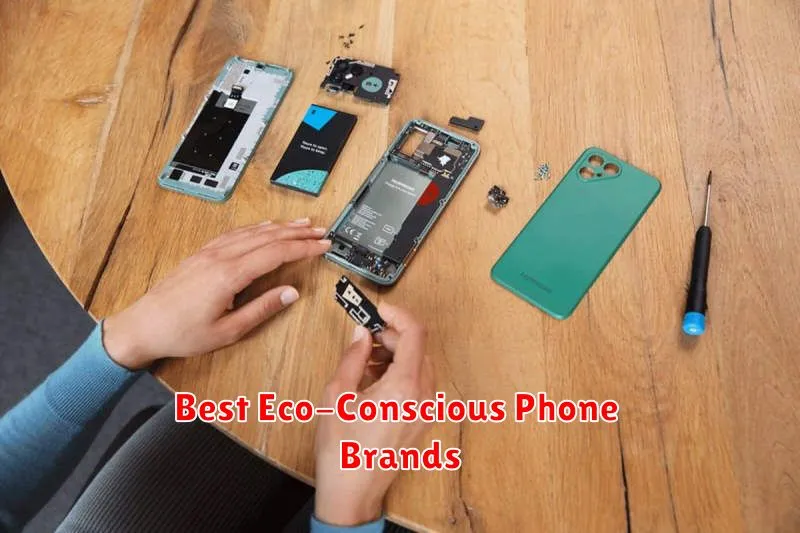In an era of increasing environmental consciousness, the rise of eco-friendly smartphones and sustainable tech is a welcome development. Consumers are becoming more aware of the environmental impact of their electronic devices, from manufacturing and resource depletion to e-waste and carbon emissions. This heightened awareness is driving demand for more sustainable options in the tech industry, pushing manufacturers to innovate and prioritize eco-friendly practices in the design, production, and lifecycle management of their products. The shift towards sustainable technology reflects a broader movement towards responsible consumption and a growing commitment to mitigating the effects of climate change.
This article will explore the burgeoning trend of eco-friendly smartphones and the broader movement towards sustainable tech. We will delve into the innovative materials and manufacturing processes being employed, examine the concept of circularity in the tech industry, and discuss the challenges and opportunities associated with creating truly sustainable electronic devices. From recycled materials and reduced packaging to energy-efficient designs and extended product lifespans, discover how the tech industry is evolving to embrace sustainability and address the environmental impact of our increasingly connected world. We will also consider the role of consumers in driving this important shift towards eco-conscious technology and a greener future.
What Is an Eco-Friendly Smartphone?
An eco-friendly smartphone, also known as a sustainable or green phone, is designed to minimize its environmental impact throughout its entire lifecycle. This encompasses everything from resource extraction and manufacturing to packaging, usage, and eventual disposal or recycling.
These devices prioritize the use of recycled materials, such as reclaimed plastic and metals, in their construction. They also emphasize fair labor practices and reduced carbon emissions during production. Furthermore, eco-friendly smartphones often feature designs that promote durability and repairability, extending their lifespan and reducing electronic waste.
Key features often include:
- Recycled or sustainably sourced components
- Modular design for easy repairs and upgrades
- Energy-efficient hardware and software
- Eco-friendly packaging
- Take-back programs for responsible recycling
Materials and Recycling Programs
The shift towards eco-friendly smartphones involves a greater emphasis on sustainable materials. Manufacturers are increasingly incorporating recycled materials like aluminum, plastic, and glass into their devices. This reduces the demand for virgin resources and minimizes the environmental impact of mining and processing.
In addition to using recycled materials, companies are also implementing take-back programs and partnering with recycling facilities. These initiatives aim to recover valuable components from end-of-life devices, such as precious metals and rare earth elements, preventing them from ending up in landfills. These programs encourage responsible disposal and contribute to a circular economy for electronics.
Sustainable Manufacturing Practices

Sustainable manufacturing aims to minimize environmental impact throughout a product’s lifecycle. This involves reducing waste, conserving resources, and prioritizing eco-friendly materials.
Key practices include:
- Closed-loop systems: Reclaiming and reusing materials to minimize waste.
- Renewable energy: Powering manufacturing facilities with solar, wind, or other renewable sources.
- Design for disassembly: Creating products that can be easily taken apart for repair and recycling.
- Reduced material use: Minimizing the amount of raw materials needed for production.
These practices not only lessen the environmental footprint but can also lead to cost savings for manufacturers through increased efficiency and reduced waste disposal.
Fair Trade and Ethical Sourcing
Fair trade practices are increasingly crucial in the electronics industry, aiming to ensure equitable compensation and safe working conditions for individuals involved in the supply chain. This encompasses mining for raw materials like cobalt and tin, essential components of smartphones and other tech devices.
Ethical sourcing goes hand-in-hand with fair trade, focusing on the responsible acquisition of materials. This means minimizing environmental damage from mining operations and ensuring that workers’ rights are protected throughout the entire process. Consumers are becoming more aware of the origins of the products they buy, driving demand for ethically sourced and manufactured electronics.
Choosing smartphones from companies committed to these principles promotes a more sustainable and just tech industry.
Energy Efficiency Ratings
Energy efficiency is a key factor in eco-friendly smartphones. These ratings help consumers understand a device’s power consumption and its environmental impact. Several standards and certifications exist to evaluate this.
One common rating system focuses on standby power consumption, measuring the energy used when the device is idle. Another assesses the efficiency of the charging process itself, identifying energy loss during power transfer. Manufacturers are increasingly designing phones with more energy-efficient components and optimized software to reduce overall power usage.
Longevity and Software Support
A key aspect of eco-friendly smartphones is their longevity. Extending the lifespan of devices significantly reduces electronic waste. This involves both durable hardware design and sustained software support.
Software updates play a crucial role in maintaining device security and functionality. Manufacturers committed to sustainability should provide long-term software updates, including security patches and operating system upgrades, for their devices. This allows users to keep their phones for longer, reducing the need for frequent replacements.
Modular designs can also contribute to longevity. The ability to easily repair or upgrade individual components, like the battery or camera, extends the usable life of a smartphone and reduces the environmental impact of manufacturing entire new devices.
Second-Life and Refurbished Phones
The market for second-life and refurbished phones is experiencing significant growth, driven by both economic and environmental factors. Refurbished phones offer a cost-effective alternative to buying new, providing access to high-quality devices at a reduced price.
These phones undergo a rigorous testing and repair process, ensuring they meet specific quality standards. Choosing a refurbished phone significantly reduces electronic waste, contributing to a more sustainable electronics industry.
Purchasing a pre-owned or refurbished phone extends the lifespan of existing devices, delaying the need for new production and its associated environmental impact.
Minimal Packaging Initiatives
Reducing packaging waste is a key element of sustainable smartphone production. Many companies are now embracing minimalist packaging designs.
This typically involves: eliminating unnecessary plastic inserts, using recycled and/or sustainably sourced materials for the box itself, and reducing the overall size and weight of the packaging.
Some manufacturers are also exploring innovative alternatives like using plant-based inks and molded pulp for internal cushioning. These initiatives contribute significantly to lowering a product’s environmental footprint.
Green Certifications and Labels
Navigating the world of eco-friendly electronics can be challenging. Green certifications and labels help consumers identify devices that meet specific environmental standards. These labels signify reduced environmental impact throughout a product’s lifecycle, from manufacturing to disposal.
Several prominent certifications exist for electronics. Look for labels like EPEAT (Electronic Product Environmental Assessment Tool), which assesses products based on criteria like energy efficiency and material selection. TCO Certified is another important standard, focusing on socially responsible manufacturing and product longevity.
Understanding these certifications empowers consumers to make informed choices and support companies committed to sustainable practices.
Best Eco-Conscious Phone Brands

Several phone manufacturers are stepping up to prioritize sustainability. Choosing a phone from these brands can contribute to a greener future.
Leading the Charge
Fairphone focuses on ethical sourcing and repairability, maximizing the lifespan of their devices. Teracube also emphasizes longevity and offers multi-year warranties.
Making Strides
Larger manufacturers like Apple and Samsung are incorporating recycled materials and improving their recycling programs, although further progress is needed. Look for models highlighting these features.

